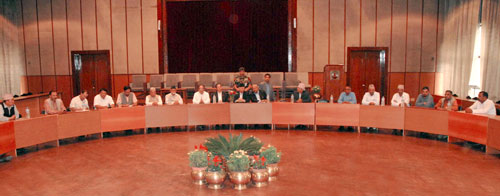 BIKRAM RAI |
The glaring loopholes in the interim constitution provide a lot of elbow room for the political parties to undo the mess they created by letting the CA lapse on 27 May. They must use these to clean up the mess they made instead of waiting for someone else to do it.
Although they moan and groan about it, almost everyone is happy with the postponement of the constitution. The opposition NC and UML got what they wanted, they have reduced the government to a lame duck that can neither bring a full budget nor prepare for elections. The Maoist-Madhesi coalition led by Prime Minister Baburam Bhattarai seems fairly certain they won't have to step down any time soon.
The election commission has said that it will not be possible to hold polls by 22 November unless the parties sort out their squabbling and amend the constitution in the next 10 days.
On Tuesday, Bhattarai called an all party meeting with four very specific agendas: budget, new government, elections and constitution. The opposition parties boycotted the meeting, but attended the all party meeting called by Maoist Chairman Pushpa Kamal Dahal at BICC, the same evening. Besides bringing the Dahal-Bhattarai competition for influence out in the open, the meeting was also interesting because it ignored the constitution and elections, but agreed on a preliminary budget.
Bhattarai's unchallenged power is making everybody, including his own party chairman, uncomfortable. But whoever comes to power next will also be unchallenged, except under two conditions: reviving the CA which will then pave way for the declaration of the constitution or holding the CA elections in November. That is why there must be an agreement on one of the two before Bhattarai steps down.
Many, including opposition leaders, intellectuals and legal experts have rejected the possibility of reviving the house. They argue that a dead institution cannot be revived. Similarly, on the question of next CA elections, they maintain that the last four years of exercise proved to be an expensive 'misadventure' and therefore a new way must be found. While the proposition has been able to cash in on the immediate resentment of the public, it is still an undemocratic and unconstitutional one.
To begin with, the Supreme Court and legal experts have to take note that Article 64, under which the CA was dissolved runs counter to Article 82 which states that the CA will be dissolved on the day it promulgates a new constitution, not before that. Nowhere in the 22 page long verdict that supposedly sealed the fate of the CA has the Supreme Court cleared this ambiguity.
Besides, there is also Article 158 which gives the cabinet the right to remove any difficulties while implementing the provisions in the constitution, provided it is endorsed by the House within a month. So if there is a political consensus among the parties, the cabinet can revive the house and seek its endorsement within 30 days.
This is not wishful thinking, these are perfectly legitimate legal loopholes in the interim constitution that the parties can use to undo their blunder if they want to avoid another expensive 'misadventure'. The opposition must stop provoking the president to overstep his jurisdiction of a ceremonial role and negotiate its terms fair and square.
The NC and UML leaders have been speaking in public that the next elections, whenever they are held, should be for a parliament which would then form an 'expert panel' to give final shape to the constitution. The interim constitution of 2007, however, does not envision a constitution drafted by any other body except a constituent assembly. The preamble of the interim constitution clearly states that the present constitution will 'be in force until a new constitution is framed by a constituent assembly'.
"Any attempt to draft a statute through a selected group of political appointees will not just be unconstitutional, it will go against the spirit of the 2006 movement," says constitutional expert Daman Nath Dhungana.
If the opposition is aware that there is no alternative to reviving the house or going for new CA elections in order to declare a statute, why is it rejecting both propositions?
We will see as the monsoon drags on how long the present government can survive, but it doesn't seem to matter who is in Singha Darbar anymore.
The fate of the government is inextricably tied to the fate of the Constituent Assembly because it is the basis of a new and inclusive Nepal we all fought for, and dreamed of.
Read the full text of the Supreme Court's verdict on the 10th amendment of Interim Constitution 2007
Full text of the Supreme Court's verdict on 10th amendment of Interim Constitution 2007



